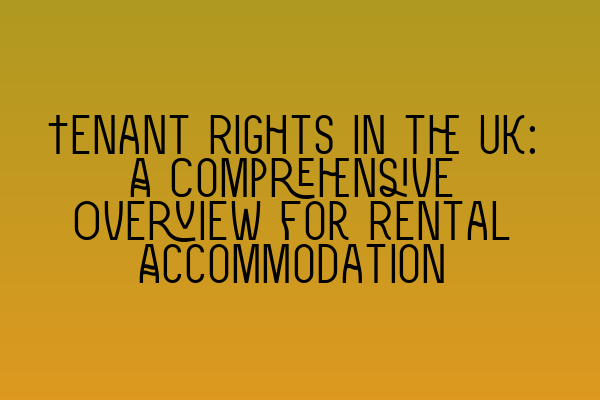Tenant Rights in the UK: A Comprehensive Overview for Rental Accommodation
Are you a tenant in the UK? Do you understand your rights when it comes to rental accommodation? It’s crucial for tenants to be aware of their rights and responsibilities to ensure a smooth and fair tenancy experience. In this comprehensive overview, we will delve into various aspects of tenant rights in the UK, providing you with valuable information and guidance. So, let’s get started!
1. Types of Tenancy Agreements
There are several types of tenancy agreements in the UK, and it’s essential to understand which one applies to your situation. The most common types include Assured Shorthold Tenancy (AST), Assured Tenancy, and Excluded Tenancy/Lodger Agreement. Each type has different rights and restrictions, so make sure to familiarize yourself with the specific terms of your agreement.
2. Rent and Rent Increases
As a tenant, you have the right to know how much rent you need to pay and when it is due. Your tenancy agreement should clearly outline these details. Landlords are generally allowed to increase the rent after a fixed-term tenancy ends, but they must follow certain rules and provide proper notice. If you believe your rent increase is unfair, consult with a legal professional for advice and support.
3. Deposit Protection
When you rent a property in the UK, your landlord is legally required to protect your deposit through a government-approved tenancy deposit protection scheme. These schemes ensure that you’ll get your deposit back at the end of the tenancy, provided you meet the agreed terms and conditions and return the property in good condition. If your landlord fails to protect your deposit, you may be entitled to compensation.
4. Repairs and Maintenance
Your landlord is responsible for ensuring that the property is safe, habitable, and free from serious defects. If any repairs are needed, you should inform your landlord promptly. They must address the issue within a reasonable time frame. In some cases, tenants have the right to request repairs through the Local Authority if the landlord fails to take action. Remember to keep records of any communication regarding repairs and maintenance.
5. Right to Quiet Enjoyment
As a tenant, you have the right to enjoy your rented property without unnecessary interference from the landlord. This means that your landlord cannot enter your property without proper notice, except in cases of emergency. You should also be aware of noise restrictions and respectful behavior towards the neighbors.
6. Eviction and Notice Periods
If your landlord wants to end your tenancy, they must follow the correct legal procedure. The notice period required will depend on the type of tenancy agreement you have. For example, under an AST, your landlord must provide a minimum of two months’ notice and obtain a court order before evicting you. It’s vital to understand your rights and seek legal advice if you feel your eviction is unfair or unjust.
7. Discrimination and Harassment
Tenants in the UK are protected against discrimination and harassment under the Equality Act 2010. Landlords cannot refuse to rent to you or treat you unfairly based on your age, disability, gender, race, religion, sexual orientation, or any other protected characteristic. If you believe you have been a victim of discrimination or harassment, consider reporting the incident and seeking legal assistance.
8. Ending the Tenancy
When you decide to end your tenancy, you must provide your landlord with proper notice as specified in your tenancy agreement. Be prepared to return the property in the same condition as when you moved in, allowing for reasonable wear and tear. Your landlord should conduct a final inspection and return your deposit, minus any deductions for damages or unpaid rent.
Understanding your rights as a tenant is crucial for a successful and hassle-free tenancy experience. If you face any issues or have concerns about your landlord’s actions, seek professional legal advice to ensure your rights are protected.
For further resources and preparation for the SQE exams, check out these related articles:
– SQE 1 Practice Exam Questions
– SQE 1 Practice Mocks FLK1 FLK2
– SQE 2 Preparation Courses
– SQE 1 Preparation Courses
– SRA SQE Exam Dates
We hope this comprehensive overview has provided you with valuable insights into tenant rights in the UK. Remember, knowledge is power, so stay informed and assert your rights as a tenant.
